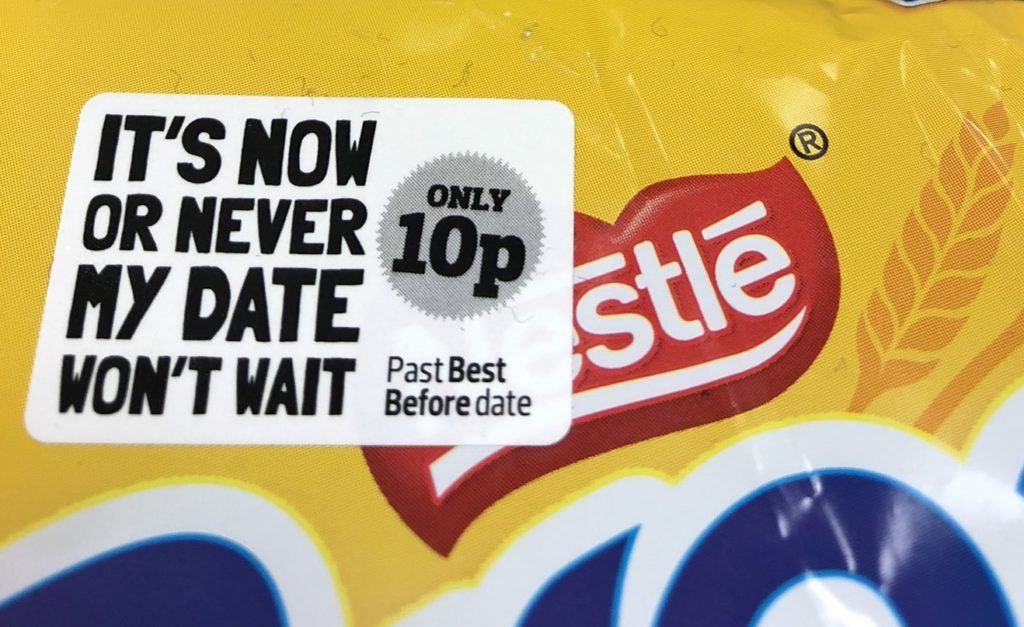Would you like to know how to stock your entire pantry for just a few bucks, by buying brand-name bagged, boxed and canned food for about 13 cents each?
You don’t even need coupons, or the ability to sniff out hard-to-find deals. You just have to be sure you don’t mind food that’s “gently expired”.
A grocery chain in Britain hopes to set an example for the world, by becoming the first major grocer to regularly (and knowingly) offer products for sale beyond their printed expiration dates.
Mmmm… sour milk and mushy bananas for pennies on the dollar – what’s not to like?
Okay, so it’s not quite like that. The East of England Co-op, which runs about 125 food stores in a region northeast of London, has announced a new initiative to combat food waste by selling expired products for pennies apiece. The products themselves are still safe and edible – they’ve just managed to remain on the shelf beyond their sell-by dates, which many industry experts acknowledge are often arbitrary and not an indicator that the food is no longer good to eat.
Often, you’ll see products with discount stickers on them, or they’ll be relocated to the bargain bin, if they’re close to expiring at your neighborhood grocery store. But once they hit that magic best-by date, they’re out the door, destined for the dumpster or the closeout store.
The East of England Co-op wants to change that dynamic, by offering expired products for sale in the very stores where they were originally offered – at a steep discount. All products that have passed their best-by dates are sold for a flat 10 pence each, or about 13 cents.
“This is not a money-making exercise, but a sensible move to reduce food waste and keep edible food in the food chain,” East of England Co-op Joint Chief Executive Roger Grosvenor said in a statement announcing the new initiative. “By selling perfectly edible food, we can save 50,000 items every year which would otherwise have gone to waste.”
And during a three-month test in a handful of stores, Grosvenor said the plan worked even better than expected. Most discounted items sold out within hours, if not sooner. “The vast majority of our customers understand they are fine to eat and appreciate the opportunity to make a significant saving on some of their favorite products,” he said.
Included are most canned goods, along with dry bagged and boxed foods that don’t instantly go bad the day after their printed “best by” dates. While these items are perfectly fine to eat months or even years later, most grocers don’t want to be caught with anything less than the freshest foods on their shelves. So many will donate these items to charity, offer them to resellers who will distribute them to “scratch-and-dent” stores, or simply toss them.
And that’s led to a growing food waste problem – both here in the United States, and abroad. The British government estimates that residents there throw away more than 7 million tons of food every year. In the U.S., that figure is 38 million tons, according to the Environmental Protection Agency.
Much of that waste is due to those often-confusing and misunderstood printed expiration dates. So some advocates have proposed revamping or eliminating many of those dates altogether. U.S. lawmakers have introduced legislation to create a uniform, streamlined national date labeling system. And food industry groups have followed suit, proposing that the variety of phrases like Sell By, Use By, Expires On, Best Before, Better if Used By or Best By that are currently used, be narrowed down to just two – “Use by” would apply to perishable products that should not be eaten after they expire, while “Best if used by” would apply to products that may not be at peak quality after the printed date, but are still safe to eat.
And that is the case with most packaged foods. The website EatByDate.com lists various products and how long they’re really good to eat, regardless of the date on their label. Dried pasta is fine for up to two years past its printed expiration date, the site says, while an unopened jar of instant coffee can last as long as 20 years.
A recent YouGov survey found that consumers don’t mind expired food so much anyway. In fact, they seem more troubled by expired products on their grocery shelves, than they are if the products are in their own home. Fully 78% of those surveyed said they would be willing to eat bread in their home that was past its expiration date, while 74% would eat past-its-prime cheese and 64% don’t mind expired eggs. And the survey didn’t even include boxed, packaged or canned foods that can last for years.
So watch the products on the shelves of your local grocery store, to see if the East of England Co-op’s idea catches on. If so, you could do your part to help save the planet – while saving a whole lot of money in the process.
















